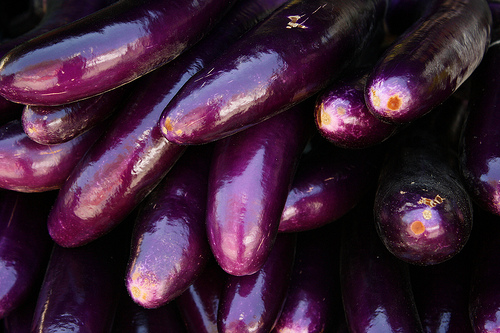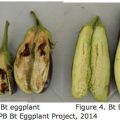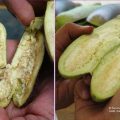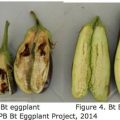Some 100 farmers are asking President Benigno S. Aquino III to allow them to start planting the banned Bt eggplant believing it will reduce health-harmful pesticide spraying and will improve consumers’, farmers’, and environmental health.

By signing a Declaration of Support (DOS), farmers mostly planting eggplant from San Pablo City, Laguna and Sariaya, Quezon assert they need the Bt eggplant seeds to become more successful.
“We realize that Bt eggplant, which contains the gene similar to the insect resistant Bt corn, can bring benefits to their respective farming communities such as higher yield and income, reduced chemical pesticide use, and improved environmental health,” they said in the signed DOS.
The DOS was signed during a public dialogue together with scientists and farmer resource persons at the South East Asian Regional Center for Graduate Study and Research in Agriculture, Los Banos, Laguna.
Bt eggplant has the gene Bt or Bacillus thuringiensis that combats the very infesting Fruit and Shoot Borer (FSB). It is a beneficial bacterium commonly found in the soil. Bt is harmful to the pest because of their alkaline-type stomach. It is not harmful to human which has an acidic stomach. Tests proved its safety as food based on tests on allergenecity and toxicity. It has all the nutrients equivalent to common eggplants.
It was developed by state-run University of the Philippines Los Banos and is also seen to help solve problems of hunger and poverty.
Eggplant farmer Henry Rucafor of Brgy. San Cristobal, San Pablo City said he hopes the seeds will be made available sooner.
“They should already launch it so that we can try to improve our livelihood,” Rucafor said in Filipino. “One hundred percent of our farmers want Bt eggplant.”
Rucafor admits farmers in San Pablo City do not practice donning protective personal equipment or PPE to protect themselves from the harmful spraying.
“It’s difficult to find those (equipment),” he said. He admits somebody else, a farm hand, does the spraying for him. He planted eggplant on his 8,000 square meters farm this season.
On his first try at eggplant farming, he earned a gross of P100,000, that seemed to be a beginners’ luck.
Later on, he encountered how destructive the pest FSB is. Infestation could wipe out 50 percent of harvest and income.
He started using different kinds of pesticides to battle FSB. Among the sprays are Brodan and Pegasus.
“You cannot use the same brand of pesticide again and again because one kind may not always be effective. You have to try different ones every now and then,” said Rucafor.
He has been planting eggplant for around 20 years.
Pesticide spraying is dreaded by farmers themselves. They as they expose themselves directly to the mists in spraying.
However, the farmers are up against a Writ of kalikasan with Temporary Environmental Protection Order against the genetically modified Bt eggplant issued by the Court of Appeals (CA).
They expect the Supreme Court to reverse the CA order which effectively banned Bt eggplant field trials, consequently the seeds’ commercial release.
In the DOS, the farmers said they UPLB’s multi-location field trials complied with government’s strict environmental regulation. Its safety as food has also been well-proven.
“We recognize the safety of products of modern biotechnology that have passed food safety assessment based on international standards such as the United Nations Food and Agriculture Organization and World Health Organization CODEX Alimentarius Risk Analysis of Food Derived from Modern Biotechnology,” they said.
National food security can be achieved in the Philippines given the use of science to solve food problems, according to the DOS.
“We will keep ourselves updated on science-based and factual information so that we can be a partner in the policy and decision-making process towards the use of agri-biotechnology to attain food sustainability and food security.”
In Sariaya, Quezon, Tomas Villamin, an eggplant farmer of the San Roque Farmers’ Assn., said he believes government should first let farmers use the Bt eggplant seeds before concluding that it is harmful.
“Maybe it’s not too much for us to ask for government to first allow us to use it and let us experience a better livelihood,” he said in Filipino. “Let’s try it first. If it’s bad, then let’s stop it.”
Reyes admits to not wearing protective gears while spraying.
“It’s irrigating to use them. I can’t breathe with that gear (mask) on,” he said.
He laments that because of the pest FSB, many eggplants cannot be sold in the market.
The rejects, though, which have untidy appearance because of the black tunnels bored by the FSB inside the eggplant flesh, have uses.
“Some are given as feeds to the carabao. They are also cut into the ingredients for pakbet, the holes are just removed,” he said.
Reyes is certain Bt eggplant seeds will be sold out once released.
“When farmers hear about any product that is good, they will buy that in order to avoid pesticide spraying,” he said.
He will be able to omit much use of the insecticide Prevathon.
“There are times we spray once a week, and some two times a week,” he said.
Farmers are known to spray 60 to 80 times during a 120-day eggplant season. They may spend as much as 50 percent of around P50,000 per hectare production cost just to battle pests. That includes labor and spray.
Rosie Reyes, an eggplant sorter, is afraid of the harmful effects of pesticide spraying on farmers.
“Umiikli ang buhay ng magsasaka dito. Sa amoy pa lang ng pestisidyo, nakakatakot nang isipin (ang epekto) lalo na kapag sutil ang nag-spray. Kailangan talaga gumamit ng mask,” Reyes said.
For any questions or interview requests, please contact 0999-573-7077 or 0917-733-6628.






